
Yugoslavia was a country in Southeast Europe and Central Europe for most of the 20th century. It came into existence after World War I in 1918 under the name of the Kingdom of Serbs, Croats and Slovenes by the merger of the provisional State of Slovenes, Croats and Serbs with the Kingdom of Serbia, and constituted the first union of the South Slavic people as a sovereign state, following centuries in which the region had been part of the Ottoman Empire and Austria-Hungary. Peter I of Serbia was its first sovereign. The kingdom gained international recognition on 13 July 1922 at the Conference of Ambassadors in Paris. The official name of the state was changed to Kingdom of Yugoslavia on 3 October 1929.

The Kingdom of Yugoslavia was a state in Southeast and Central Europe that existed from 1918 until 1941. From 1918 to 1929, it was officially called the Kingdom of Serbs, Croats and Slovenes, but the term "Yugoslavia" was its colloquial name due to its origins. The official name of the state was changed to "Kingdom of Yugoslavia" by King Alexander I on 3 October 1929.

The Socialist Federal Republic of Yugoslavia, commonly referred to as SFR Yugoslavia or simply Yugoslavia, was a socialist country in Southeast and Central Europe that existed from its foundation in the aftermath of World War II until its dissolution in 1992 amid the Yugoslav Wars. Covering an area of 255,804 km2, the SFRY bordered the Adriatic Sea and Italy to the west, Austria and Hungary to the north, Bulgaria and Romania to the east, and Albania and Greece to the south. It was a one-party socialist state and federation governed by the League of Communists of Yugoslavia and made up of six socialist republics—Bosnia and Herzegovina, Croatia, Macedonia, Montenegro, Serbia, and Slovenia—with Belgrade as its capital; it also included two autonomous provinces within Serbia: Kosovo and Vojvodina.

The Yugoslavia national football team represented Yugoslavia in international association football.
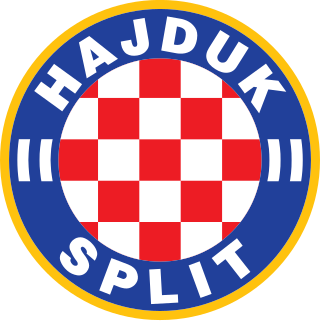
Hrvatski nogometni klub Hajduk Split, commonly referred to as Hajduk Split or simply Hajduk, is a Croatian professional football club based in Split, that competes in the Croatian First League, the top tier in Croatian football. Since 1979, the club's home ground has been the 34,198-seater Stadion Poljud. The team's traditional home colours are white shirts with blue shorts and blue socks.

Yugoslavs or Yugoslavians is a designation that was originally designed to refer to a united South Slavic people. It has been used in two connotations, the first in an ethnic or supra-ethnic connotation, and the second as a term for citizens of the former Yugoslavia. Cultural and political advocates of Yugoslav identity have historically ascribed the identity to be applicable to all people of South Slav heritage, including those of modern Bosnia and Herzegovina, Croatia, Montenegro, North Macedonia, Serbia, and Slovenia. Although Bulgarians are a South Slavic nation, attempts at uniting Bulgaria into Yugoslavia were unsuccessful, and therefore Bulgarians were not included in the panethnic identification.

The Football Association of Yugoslavia (FSJ) was the governing body of football in Yugoslavia, based in Belgrade, with a major administrative branch in Zagreb.
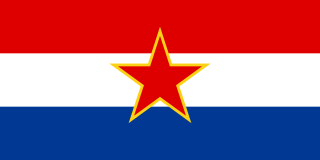
The Socialist Republic of Croatia, or SR Croatia, was a constituent republic and federated state of the Socialist Federal Republic of Yugoslavia. By its constitution, modern-day Croatia is its direct continuation.

HŠK Građanski, also known as 1. HŠK Građanski or fully Prvi hrvatski građanski športski klub, was a Croatian football club established in Zagreb in 1911 and dissolved in 1945. The club had a huge influence on the development of football in Croatia and Kingdom of Yugoslavia and achieved its greatest success in the period between the two World Wars.

Stadion u Kranjčevićevoj ulici, also known as Stadion Concordije between 1921 and 1945, is a multi-purpose stadium located in Trešnjevka neighbourhood, in the Croatian capital of Zagreb. It is mainly used for football matches and was historically the home ground of NK Zagreb until their eviction from the ground in 2018. More recently the stadium has been the home ground for Croatian First League side NK Lokomotiva. In addition, NK Rudeš use the stadium for selected matches, particularly Croatian First League games. First opened in 1921, it has undergone many renovations and facelifts, with its current layout dating back to the 1987 Summer Universiade renovation. The Croatia national football team played only once at the stadium in a 3–0 friendly game win against South Korea on 13 March 1996. With its reduced capacity from 2008, the stadium can hold 8,850 people, which makes it the second biggest stadium in Zagreb, behind Stadion Maksimir. In 2018, the stadium was refurbished with chairs installed in the eastern grandstand and a new hybrid lawn installed, leaving it with a seating capacity of 5,350 seats.

HAŠK(full name Hrvatski akademski športski klub, English: Croatian Academic Sports Club) was a Croatian football club established in Zagreb in 1903 which ceased operating in 1945. The club was one of the most successful sides in Zagreb and the Kingdom of Yugoslavia in the period between the two World Wars. Since then several sports clubs have claimed to descend from it, the most significant of which is HAŠK Mladost sports society.
Dragutin Karlo Novak was the first person in Croatia to make a heavier-than-air flight by flying a plane constructed by Slavoljub Eduard Penkala, June 22, 1910.

Sportski klub Jugoslavija, commonly known as SK Jugoslavija was a Serbian football club from Belgrade. It was originally formed as SK Velika Srbija in 1913 and changed its name to SK Jugoslavija in 1919. They were among the most popular Serbian and Yugoslav clubs, and they were nicknamed as "Crveni" because of their red shirts, in opposition to their greatest rivals BSK, who wore blue and were known as "Plavi". Until 1941 the sports society Jugoslavija, beside football, also included sections for athletics, cycling, winter sports, basketball, boxing, wrestling, swimming, and table tennis.
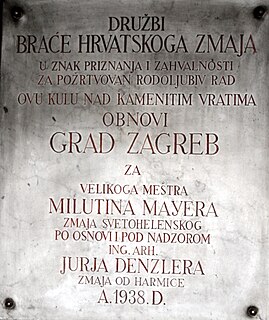
The Society of Brethren of the Croatian Dragon is a Croatian historical and cultural society founded on November 16th, 1905.
During World War II the Independent State of Croatia awarded a number of orders, decorations and medals.
Károly Nemes was a Hungarian football goalkeeper and coach. He is best known for his work on champion teams of SK Rapid Wien and SK Jugoslavija. He coached throughout Central and South-Eastern Europe.
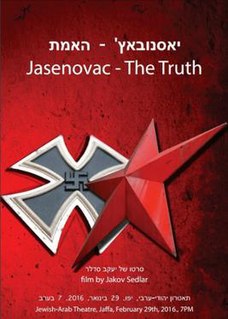
Jasenovac – istina is a 2016 Holocaust denial and pseudohistoric documentary film by the Croatian filmmaker Jakov Sedlar. The film contends that the extent of the Holocaust in Croatia and the World War II-era genocide of the country's Serb population was exaggerated through post-war communist propaganda. It focuses primarily on Jasenovac, a concentration camp run by Croatia's wartime fascist Ustaše government where an estimated 100,000 are believed to have perished, and suggests that the actual death toll never exceeded 18,000. The film also argues that Jasenovac continued being used as a concentration camp by Yugoslavia's communist authorities well after World War II, and that more inmates perished when it was run by the communists than when it was run by the Ustaše.
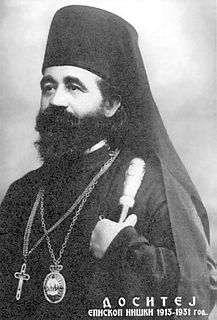
Dositej Vasić was the first Serbian Orthodox Metropolitan of Zagreb and a victim of the genocide of Serbs in the Independent State of Croatia.
Anarchism in Croatia first emerged in the late 19th century within the socialist workers' movement. Anarchist tendencies subsequently spread from neighboring countries, taking root in a number of cities throughout the country. The movement experienced repression from a succession of authoritarian regimes before finally reemerging around the time of the independence of Croatia.












